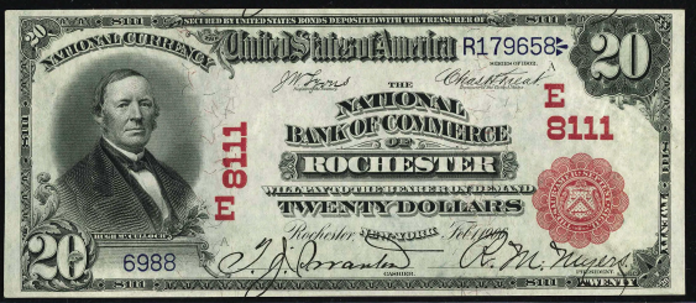Twenty Dollar Notes › Nationals › 1902 Twenty Dollar National Bank Notes › Massachusetts Charters › 1902 $20 Barre Massachusetts Second National Bank
Get Value Now
| Item | Info |
|---|---|
| Series | 1902 |
| Charter | #10165 Second National Bank of Barre, Massachusetts |
| Year Chartered | 1912, 186 Banks Chartered |
| City Info | Barre is a town in Worcester County, Massachusetts, United States. The population was 5,398 at the 2010 census. Originally called the Northwest District of Rutland, it was first settled in 1720. The town was incorporated on June 17, 1774, as Hutchinson after Thomas Hutchinson, colonial governor of Massachusetts. But on November 7, 1776, it was renamed Barre in honor of Isaac Barré, an Irish-born MP who was a champion of American Independence. Starting in the 1800s, the Boston, Barre and Gardner Railroad provided rail service to the town. Source: Wikipedia |
| Similar Cities | If your note doesn't match try: 1. Wilkes-Barre, Pennsylvania - First National Bank 2. Barre, Massachusetts - First National Bank 3. Wilkes-Barre, Pennsylvania - Second National Bank 4. Wilkes-Barre, Pennsylvania - Wyoming National Bank 5. Barre, Vermont - National Bank of Barre 6. Barre, Massachusetts - First National Bank 7. Wilkes-Barre, Pennsylvania - First National Bank 8. Barre, Vermont - Peoples National Bank 9. Ashley, Wilkes-Barre, Pennsylvania - First National Bank 10. Wilkes-Barre, Pennsylvania - Luzerne County National Bank 11. Edwardsville, Wilkes-Barre, Pennsylvania - People's National Bank |
| Seal Varieties | Red, Blue |
| See Also | If your note doesn't match try: 1. 1905 $20 Gold Certificate 2. 1906 $20 Gold Certificate |
| Other Info | 1. Value depends on notes known for charter, condition and market demand. |
| Neat Fact | Engraved date is when bank was organized, a 20 or 40 year anniverary of its organization, or date of title change (Kelly, 5th Ed. P 5 & Huntoon 1995). |
No Obligations Offers and Appraisals
Please submit a good photo or scan. It will be identified and evaluated. Understand there may be subtle differences between the image you see above and your note. Signatures, design, markings and note condition will determine the offer price. Notes in Uncirculated or better condition receive the best offers.
Appraisals can be estimated for wholesale and retail prices. Wholesale is what dealers typically pay. Retail is what a collector might pay. Retail is slightly higher in most cases.
Please visit this page for USA Paper Money Reference. Do not treat this page as a reference guide, it is for appraisal and acquisition purposes only.
